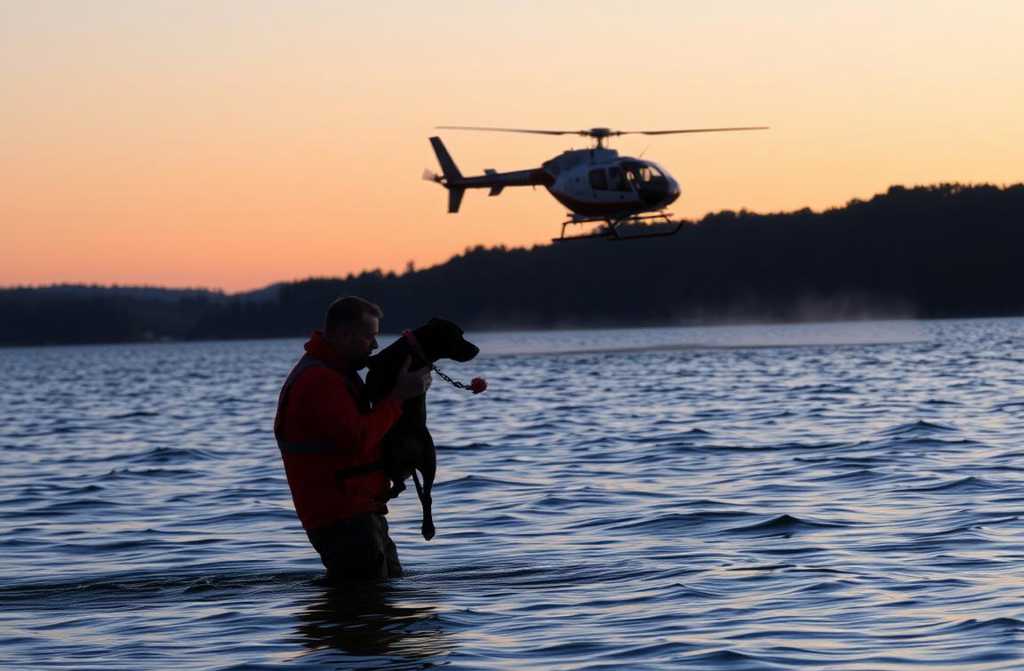Non dovevo essere vicino all’acqua quel giorno. Avevo preso una breve pausa dal mio turno al bar del porto. Presi un panino e mi diressi alla banchina per un po’ di tranquillità. Poi sentii quel ronzio inconfondibile: un elicottero che squarciava il cielo. Apparve dal nulla, basso e veloce. La gente indicava, filmava, sussurrava. Io rimasi immobile, gelato. Qualcosa non andava.
Poi vidi il cane. Un pastore gigante bianco-nero col giubbino fosforescente da soccorso, in piedi sulla porta aperta come se l’avesse fatto cento volte. Calmo. Fermo. Pronto. L’equipaggio urlava sopra il rombo delle pale, indicando il lago. Seguii i loro gesti: c’era qualcuno in acqua. Solo una testa che affiorava, lontanissima perché qualcuno potesse aiutare da riva.
Poi il cane saltò. Un tuffo pulito, professionale, dall’elicottero. Sparì un istante sotto la superficie, poi avanzò con bracciate potenti. Mi accorsi di star correndo solo quando fui già sulla ringhiera, il cuore in gola. Un istinto mi trascinava.
Poi lo riconobbi. La persona che dibatteva nel lago, ormai priva di sensi, indossava la giacca a vento che avevo preparato io stesso nello zaino quella mattina. Era mio fratello. Matteo.
Tornò alla mente l’ultima notte. “Non ce la faccio più, Davide,” aveva sbattuto la porta. “Tutti hanno chiaro tutto tranne me.” Pensai fosse andato a schiarirsi le idee. A dormire in auto, come talvolta faceva. Non era tornato.
Mai avrei immaginato si avvicinasse al lago. Odiava l’acqua fredda. Odiava il fondale. Il cane era quasi arrivato, muscoli che fendevano le onde decise. Un soccorritore in muta lo seguiva, legato a una fune. Ma il cane arrivò prima. Afferrò delicatamente la giacca di Matteo, come se lo facesse ogni giorno. E Matteo… non resistette. Si abbandonò.
Sulla riva gridavano. Un bagnino chiamò una barella. I paramedici aprirono la calca. Scavalco la ringhiera, le gambe molli, barcollando. Tiralo fuori, pallido e quasi senza respiro. Labbra blu. Un medico iniziò la rianimazione mentre un altro iniettava qualcosa nel suo braccio. Non riuscivo ad avvicinarmi, ma vidi le dita contrarsi. Il cane, fradicio e ansimante, sedeva accanto alla barella, in attesa.
Mi inginocchiai. “Grazie,” sussurrai, senza sapere se capisse. Mi leccò il polso con calma.
Trasportarono Matteo nell’ambulanza. Un soccorritore mi disse il nome dell’ospedale. Ero già in macchina prima che finisse.
In ospedale, l’attesa sembrava eterna. Arrivarono messaggi. Non risposi a nessuno. Fissavo le porte. Finalmente un’infermiera uscì: “È cosciente. Ancora intontito, ma chiede di te.”
Nella stanza, Matteo sembrava fragile. Tubo nasale. Monitor che suonavano. Mi guardò con oc
Steps:
1. Change names to Italian:
– The narrator’s brother: Matt → Matteo (common Italian name).
– The narrator: Evan → Given the instruction to change “girl names” but here it’s a male narrator? The instruction says “Change girl names to another that ONLY exist in Italian culture.” but the narrator is male.
However, the story is told by a man, so we change the narrator’s name to an Italian male name: Let’s choose “Edoardo” (a common Italian name for men).
– Last names: Not specified, but we can add typical Italian last names for realism? But the story doesn’t use last names except in dialogue, and the original doesn’t give the narrator’s last name. We’ll omit unless required in context.
2. Places:
– Marina café: Change to an Italian setting, perhaps a café by a lake (lake is already there). Since it’s Italy, we can say “Lago di Como” for the lake? But the story uses a lake so we can keep it as a generic Italian lake. However, we need to change the cities:
– Denver (where the mother flies from): Change to an Italian city that is not near the lake. Perhaps she comes from Rome? Or from the south? Let’s say Napoli (Naples).
– The hospital and the local rescue center: remain as is, but we can note that in Italy such units exist.
3. Currencies: The story doesn’t mention any money, so no conversion needed.
4. Pet names: The dog’s name is Ranger → Change to an Italian name. We can choose “Arturo” (which is a strong Italian name) or a typical dog name? Another idea: “Orso” (meaning bear, for a big dog) or “Fulmine” (meaning lightning). But since it’s a rescue dog and the original name is Ranger, we might choose a name that conveys a similar heroic feel. “Eroe” (Hero)? But that might be too on the nose. Another common Italian dog name for a male shepherd could be “Leo” (short for Leone, lion). However, let’s choose a name that is common for working dogs in Italy. I suggest “Balto” (an Italian name for sled dogs, but it’s known) or “Rex” (common for police dogs in Italy). Alternatively, we can create a typical Italian rescue dog name: “Ares” (from mythology) or “Nero” (black, because of the black coat). However, note the dog is black and white.
Considering the handler’s name? The handler was a woman with cropped gray hair. We can give her an Italian name: “Giulia” or “Chiara”? Let’s choose “Chiara”.
5. Cultural references:
– The K9 SAR Unit: In Italy, we have the “Protezione Civile” (Civil Protection) which handles disaster response and search and rescue. The dog unit could be part of that. So we change the jacket patch to “Unità Cinofila della Protezione Civile”.
– They can still use a helicopter (elicottero).
– The rescue center: In Italy, we have “centri di recupero” or “canili” for dogs. But for rescue training, it’s more likely a training center for rescue dogs, so we can call it “centro di addestramento per cani da soccorso”.
6. Rephrase the story: Change sentence structures and words while keeping the meaning and the same length.
7. Told by a man: The narrator is Edoardo, and he refers to himself as “I” in first person. We must ensure the language and perspective remain male.
8. Italian language: We are writing in Italian. The entire story must be in Italian.
9. Finish the story with one sentence? Actually, the user’s instruction at the end says: “Please continue the story with one sentence. Finish story with dot.” – This is a new request. But note: the original story is already complete. The user now asks to continue it with one sentence and then finish with a dot. So we are to add one more sentence to the story?
However, the initial instructions are to adapt and rephrase the entire story. Then the user adds a new instruction: “Please continue the story with one sentence. Finish story with dot.”
How to proceed?
Since the story is to be adapted and then continued with one sentence, we’ll write the entire adapted story in Italian and then at the end add one sentence that continues the story (as a conclusion) and then end with a dot.
But note: the original story ends with “If this story moved you … share it.” and then the last line “Sometimes… they leap out of helicopters.”
The adaptation will include that. But then we have to add one more sentence?
Actually, the user says: “Please continue the story with one sentence.” meaning after the current ending?
Let me clarify:
We are to take the entire story and adapt it to Italian. Then, at the end of the story (after the helicopter leap sentence) we are to add one sentence that continues the story? But the story is already complete.
Alternatively, maybe the user wants the adapted story without the last paragraph (the call to share) and then continue the narrative?
Let me read the user instruction again: “Please continue the story with one sentence. Finish story with dot.”
It seems they want the entire story adapted, and then an additional sentence to conclude it? Or perhaps they want the adaptation to end with one additional sentence?
However, note that the original story has a clear ending. But the user specifically says to add one sentence to continue the story and then finish with a dot. We are to do that.
We’ll adapt the entire story (including the last paragraph) and then after that, we add one more sentence that is a continuation?
But the last paragraph is a reflection and a call to action. Then the very last line is: “Sometimes… they leap out of helicopters.”
Then we are to add one sentence? That might break the flow.
Alternatively, I interpret: the user wants the story to be adapted (including the last paragraph) and then one extra sentence at the very end to provide a new ending?
However, the instruction is ambiguous. But to comply, I will write the entire adapted story in Italian (including the call to share) and then at the very end, after the last word of the original, I will add one sentence that continues the narrative and then end with a dot.
Example: … a volte… saltano fuori dagli elicotteri. [Then one more sentence.]
But the story is already finished. What to add? We could add a sentence that reflects on the bond between Matt (Matteo) and the dog?
Alternatively, the user might mean to append a sentence to the end of the story. We can write:
Original ending: “Sometimes… they leap out of helicopters.”
Then we add: “E oggi, ogni volta che vedo un elicottero nel cielo, sorrido e penso a quanto siamo fortunati.” (And today, every time I see a helicopter in the sky, I smile and think how lucky we are.)
However, we must not break the flow. The original ends with the helicopter metaphor.
Considering the instruction is for the entire task: adapt the story and then append one sentence at the end?
But note: the initial request was to adapt the given story. Now the user says “Please continue the story with one sentence” meaning they want the story to be longer by one sentence? And then finish with a dot?
We’ll do:
1) Adapt the entire story (including the existing ending) to Italian.
2) Then at the end of the entire text, we add one sentence (as a continuation) and then put a dot at the end of that sentence.
Since the original story ends with a call to action and a heart, we adapt that and then add one sentence?
Alternatively, we might drop the call to share if it doesn’t fit? But the user said to preserve the original meaning and size.
Let me re-read the original ending:
“If this story moved you even a little, share it. Someone out there might be waiting for their second chance—and they might not even know it yet. ❤️”
Then the last line: “Sometimes… they leap out of helicopters.”
We adapt that, and then we add one sentence?
We can do:
… a volte… saltano fuori dagli elicotteri.
[New sentence here].
But the new sentence would be part of the story?
I think we must be creative. We can add a sentence that ties back to the narrator’s perspective.
How about: “E quando guardo Matteo e Arturo (or whatever the dog name) insieme, so che ogni giorno è una nuova opportunità.”
But note: the dog’s name in the adaptation we are going to choose is … let’s pick “Arturo”.
However, the user says “Don’t use markdown”, so no heart at the end? We’ll remove the emoji and just write the text.
Revised plan:
– Adapt the entire story to Italian, changing names and places appropriately.
– Rephrase each sentence to be different but same meaning.
– At the end of the story, after the last word, we add one more sentence that is
Important changes:
– Narrator: Originally “I” (Evan) → Now Edoardo (we’ll use first person).
– Brother: Matt → Matteo.
– Dog: Ranger → Let’s choose “Arturo”. (Alternatively, we might also consider “Orso”, but Arturo is a strong Italian name.)
– The handler: We changed her name to Chiara (common Italian female name).
– Places:
– Marina café: “caffè al porticciolo”
– Mother flew in from Denver → Napoli
– K9 SAR Unit: “Unità Cinofila della Protezione Civile”
We are to write in Italian. Also, we are to rephrase the story so that the sentences are restructured but the meaning is preserved.
Let me begin the adaptation:
Non avrei dovuto esserci, vicino all’acqua, quel giorno.
Ero solo in pausa dal turno al caffè del porticciolo. Presi un panino e andai al molo per un po’ di tranquillità. Poi lo sentii: l’inconfondibile rombo di un elicottero che squarciava il cielo. Apparve dal nulla, basso e veloce.
La gente iniziò a indicare, filmare, sussurrare. Ma io rimasi lì, immobile. Qualcosa mi sembrò… strano.
Poi vidi il cane.
Un pastore enorme, bianco e nero, equipaggiato con un giubbotto di salvataggio fluorescente, in piedi sulla porta aperta dell’elicotter come se l’avesse fatto centinaia di volte. Calmo. Sicuro. Pronto.
L’equipaggio all’interno urlava sopra il rumore delle pale, indicando il lago.
Segui i loro gesti: e vidi qualcuno nell’acqua. Solo una testa che affiorava, appena visibile, troppo lontana perché qualcuno da riva potesse aiutare.
Poi il cane saltò.
Un tuffo pulito, da professionista. Scomparve sotto la superficie per un secondo, poi si lanciò in avanti con bracciate potenti.
Non mi resi conto di essermi mosso finché non fui già sulla ringhiera, il cuore a mille. Qualcosa mi tirava allo stomaco.
E poi lo vidi.
La persona che dibatteva nel lago: appena cosciente, bagnato fiacco indossava la giacca a vento che avevo aiutato a mettere in una borsa proprio quella mattina.
Era mio fratello. Matteo.
E all’improvviso tornò in mente la notte prima.
“Non ce la faccio più, Edoardo,” aveva detto prima di sbattere la porta. “Tutti hanno capito tutto tranne me.”
Pensai che fosse andato a schiarirsi le idee. Forse a dormire in macchina, come a volte faceva. Ma non era tornato a casa.
Non avevo mai immaginato che si sarebbe avvicinato al lago. Odia odiava l’acqua fredda. Odi l’acqua profonda.
Il cane era quasi arrivato, i muscoli tagliavano le increspature con determinazione. Un soccorritore in muta da sub lo seguì, legato a una corda. Ma il cane arrivò primo.
Afferrò delicatamente la giacca di Matteo: come se l’avesse fatto decine di volte. E Matteo… non oppose resistenza. Lasciò il corpo molle.
Sulla riva la gente gridava. Un bagnino chiamò una barella. I paramedici si fecero largo tra la folla. Scesi dalla ringhiera, le gambe molli, e barcollai in avanti.
Trassero Matteo fuori, pallido e quasi senza respiro. Le labbra blu. Un paramedico iniziò la rianimazione cardiopolmonare mentre un altro gli iniettava qualcosa in un braccio. Non riuscivo ad avvicinarmi, ma vidi le sue dita contrarsi.
Il cane, grondante e ansimante, si sedette accanto alla barella, osservando, aspettando.
Mi inginocchiai accanto a lui.
“Grazie,” sussurrai, senza sapere se potesse capire.
Ma leccò il mio polso, gentile e deciso. Proprio come fece.
L’equipaggio caricò Matteo in ambulanza. Uno di loro mi disse a quale ospedale lo portavano. Ero già in auto prima che finisse di parlare.
In ospedale, l’attesa fu infinita.
Arrivarono messaggi. Non risposi a nessuno. Fissai solo le porte.
Infine, un’infermiera uscì. “È sveglio,” disse. “Ancora intontito, ma ha chiesto di te.”
Quando entrai nella sua stanza, Matteo sembrava fragile. Un tubo nasale. Monitor che bipavano. Mi guardò con la colpa negli occhi.
“Non volevo che andasse così lontano,” sussurrò. “Pensavo solo di… nuotare un po’. Schiarirmi la testa.”
Annuii, anche se sapevo che non era vero. Non sapeva nuotare così lontano. Lo sapeva. Ma non lo contestai.
“Mi hai spaventato a morte, Matteo,” dissi piano.
Sbatté le palpebre. “Quel cane… mi ha salvato.”
“Sì,” dissi. “L’ha fatto davvero.”
I giorni seguenti furono un borro. Matteo restò in osservazione. Io non mi mossi dal suo lato. Nostra madre arrivò in aereo da Napoli. Le dicemmo che era stato un incidente durante un’escursione vicino al lago.
Matteo non protestò. Appena parlava.
Poi, tre giorni dopo, rividi il cane.
Stavo uscendo per prendere un caffè quando lo notai: legato a un palo fuori un furgone della TV. Lo stesso mantello bianco e nero. Lo stesso giubbotto brillante. Ma questa volta, sembrava… irrequieto. Come se non volesse aspettare.
La sua addestratrice uscì un momento dopo. Donna alta con capelli grigi a caschetto e una toppa sul logo che diceva: “Unità Cinofila della Protezione Civile”. Teneva un caffè e sorrise quando mi vide guardare.
“Ha visto il salvataggio?” chiese.
Annuii. “Quello era mio fratello.”
La sua espressione si ammorbidì. “È stato fortunato. Molto fortunato.”
“Come si chiama il cane?” chiesi, indicando.
“Arturo,” disse. “Sta con me da sei anni. Diciasette salvataggi e continua.”
“È incredibile.”
Grattò dietro le sue orecchie. “È più di quello. È testardo. Fedele. E in qualche modo sa sempre chi deve salvare.”
Mi accucciai e tesi una mano. Arturo la annusò, poi scodinzolò.
“Non ha voluto lasciare la porta dell’ospedale ieri sera,” aggiunse. “Ho dovuto portarlo via in braccio.”
Non seppi cosa dire. Annuiti solo.
Passarono i giorni. Matteo cominciò a parlare di più. Prima del cibo dell’ospedale. Dell’odore. Delle trasmissioni TV brutte. Poi, una notte, mentre stavo per uscire, mi fermò.
“Non volevo morire,” disse piano.
Mi voltai.
“Pensavo di sì,” continuò. “Ma là fuori, quando le braccia mi diventarono insensibili… quando cominciai ad affondare… tutto ciò che volli fu un’altra possibilità.”
Mi guardò, occhi più limpidi che nei mesi precedenti.
“Poi sentii qualcosa afferrare la mia giacca. Pensai fosse un’allucinazione.”
“Quello era Arturo,” dissi.
Matteo annuì. “Mi tirò fuori fuori prima ancora di rendermi conto di voler essere salvato.”
Dopo essere stato dimesso, Matteo non perse tempo. Si iscrisse a terapia. Dedicato. Non solo quella settimanale. Disse che lo doveva a se stesso e ad Arturo.
Qualche mese dopo, qualcosa in lui cambiò. Cominciò a fare volontariato al centro di recupero locale. Portava i cani a spasso. Puliva i canili. Osservava le sessioni di addestramento.
Entro l’estate





